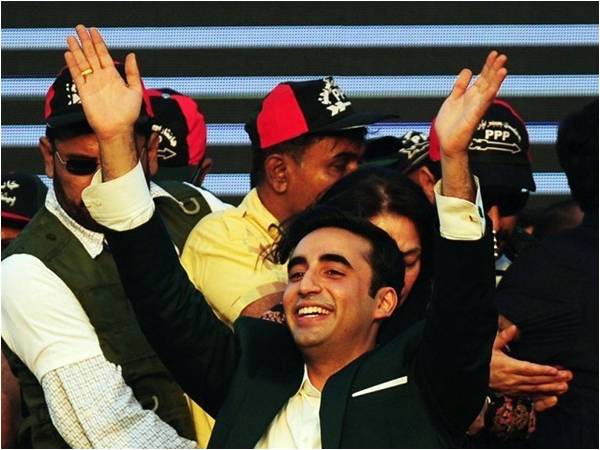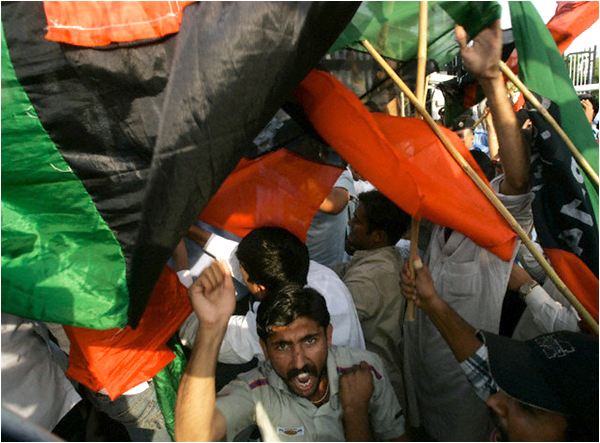
On October 18, 2014, tens of thousands of Pakistan People’s Party (PPP) workers descended upon Bagh-e-Jinnah in Karachi to hear their de facto leader, Bilawal Bhutto Zardari, son of slain Benazir Bhutto, and grandson of hung Zulfikar Ali Bhutto. What many considered to be the grandiloquent launch of Bilawal’s political career, and a re-launch of the Bhutto brand, felt lukewarm, uninspired and underwhelming.
The event was exquisitely organized. A colossal amount of effort was put into venue management and decoration. Thirteen containers had been joined together to create a colossal stage for the guest of honor. Teleprompters were set up to allow the often oratorically-challenged Bilawal to get through nearly two hours of the speech. A helicopter fittingly dropped off the prodigal son. The tri-color flag of the party fluttered prominently in the winds, flying over the sea of people who had travelled from the farthest corners of Sindh to be awed by the heir to the promise launched 40 years earlier by Zulfiqar Ali Bhutto. The stage, quite literally, was set.
[quote]The true problem was not the delivery, but the content[/quote]
The PPP has always been a party that represents the unfed, the unclothed, the homeless and the destitute. The Bhutto brand, launched first by Zulfikar Ali Bhutto, with great bravado and singular oratorical passion, served as a rallying cry for the public, catapulting the party into the national spotlight. The torch that he dropped was picked up by his daughter, Benazir Bhutto, another declamatory genius who won the hearts and minds of her people. Assassinated in December 2007, it fell to her then 19-year old son Bilawal to carry the family’s political legacy, and to continue galvanizing the huddled masses around the core of “Bhutto power”.
What followed was not the PPP’s best public performance.
Despite the incredible amount of planning and coordination that went into the physical management of the stage, the installation of the teleprompters, and the aerial entry, little effort was spent on the strengths that define the People’s Party. Bilawal’s oratorical skills have not seen much improvement, his speech heavily accented, his style decidedly timorous. His lack of flair stands out in sharp contrast to the dynamic, animated energy possessed by his grandfather, and the boisterous, tenacious vigor exhibited by his mother. The same speech, in the capable hands of Benazir or Zulfikar might have worked wonders, but the true problem was not just the delivery, it was also the content.
Bilawal’s words relied mostly on the strength and recognition of the Bhutto brand. They offered no innovation, no solutions, and little inspiration. It is not customary for a launch speech to offer practical solutions, or share innovative ideas, but the sheer lack was a sore point with some of the attendees.

Anjum, a domestic helper in Karachi, and an avid PPP supporter, was not impressed. “I don’t understand why they spent so much money on this. Why did he not say anything of [practical] value? How does this solve any of our problems?”
However, not all were fazed by content or delivery. “The speech went better than was expected, although it could have been a lot shorter,” says Aniq Zafar, a political analyst based in Islamabad. “The one thing that stands out was his attempt to position the PPP slightly left of the center, something which the top leadership of the party has failed to accomplish so far.”
Social media ran abuzz with grainy screenshots of Bilawal posing for selfies as he arrived on stage. The new rallying cry of “marsoon marsoon, Sindh na daisoon” (I will die but I will not give up Sindh), were mocked with “marsoon marsoon, kam na karsoon” (I will die, but not do any work). The helicopter entry was lambasted for helping widen the gap between Bilawal and the PPP followers. Bilawal’s general lack of zeal and enthusiasm was not able to properly rile a crowd that was promised the boy king, and was delivered just the boy.
“It will take some time for the public to get used to Bilawal’s style and delivery,” says Zafar. “It will also take some time for him to acclimate himself on how to address the public, and generate support.”
Ahmed Siyal, a PPP supporter from Karachi, was unable to reiterate the speech’s content, but he remains a dedicated adherent. He said he would vote for the PPP again, and when asked why, he said, “My father instructed me on his death bed to always vote Bhutto.”
Garnering a mixed reaction, Bilawal appeared aloof and somewhat disconnected from reality. His impression as the elite scion was cemented further. There is little that connected him, put him on an equal footing, or rooted him in the very masses from which the PPP draws its power. The arrow missed the mark in October 2014, let loose without much thought or conviction, sailing aimlessly into the void.
The author is a journalist and a development professional, and holds a master’s degree in strategic communications from Ithaca College, NY, USA
Email: zeeshan[dot]salahuddin[at]gmail.com
Twitter: @zeesalahuddin
The event was exquisitely organized. A colossal amount of effort was put into venue management and decoration. Thirteen containers had been joined together to create a colossal stage for the guest of honor. Teleprompters were set up to allow the often oratorically-challenged Bilawal to get through nearly two hours of the speech. A helicopter fittingly dropped off the prodigal son. The tri-color flag of the party fluttered prominently in the winds, flying over the sea of people who had travelled from the farthest corners of Sindh to be awed by the heir to the promise launched 40 years earlier by Zulfiqar Ali Bhutto. The stage, quite literally, was set.
[quote]The true problem was not the delivery, but the content[/quote]
The PPP has always been a party that represents the unfed, the unclothed, the homeless and the destitute. The Bhutto brand, launched first by Zulfikar Ali Bhutto, with great bravado and singular oratorical passion, served as a rallying cry for the public, catapulting the party into the national spotlight. The torch that he dropped was picked up by his daughter, Benazir Bhutto, another declamatory genius who won the hearts and minds of her people. Assassinated in December 2007, it fell to her then 19-year old son Bilawal to carry the family’s political legacy, and to continue galvanizing the huddled masses around the core of “Bhutto power”.
What followed was not the PPP’s best public performance.
Despite the incredible amount of planning and coordination that went into the physical management of the stage, the installation of the teleprompters, and the aerial entry, little effort was spent on the strengths that define the People’s Party. Bilawal’s oratorical skills have not seen much improvement, his speech heavily accented, his style decidedly timorous. His lack of flair stands out in sharp contrast to the dynamic, animated energy possessed by his grandfather, and the boisterous, tenacious vigor exhibited by his mother. The same speech, in the capable hands of Benazir or Zulfikar might have worked wonders, but the true problem was not just the delivery, it was also the content.
Bilawal’s words relied mostly on the strength and recognition of the Bhutto brand. They offered no innovation, no solutions, and little inspiration. It is not customary for a launch speech to offer practical solutions, or share innovative ideas, but the sheer lack was a sore point with some of the attendees.

Anjum, a domestic helper in Karachi, and an avid PPP supporter, was not impressed. “I don’t understand why they spent so much money on this. Why did he not say anything of [practical] value? How does this solve any of our problems?”
However, not all were fazed by content or delivery. “The speech went better than was expected, although it could have been a lot shorter,” says Aniq Zafar, a political analyst based in Islamabad. “The one thing that stands out was his attempt to position the PPP slightly left of the center, something which the top leadership of the party has failed to accomplish so far.”
Social media ran abuzz with grainy screenshots of Bilawal posing for selfies as he arrived on stage. The new rallying cry of “marsoon marsoon, Sindh na daisoon” (I will die but I will not give up Sindh), were mocked with “marsoon marsoon, kam na karsoon” (I will die, but not do any work). The helicopter entry was lambasted for helping widen the gap between Bilawal and the PPP followers. Bilawal’s general lack of zeal and enthusiasm was not able to properly rile a crowd that was promised the boy king, and was delivered just the boy.
“It will take some time for the public to get used to Bilawal’s style and delivery,” says Zafar. “It will also take some time for him to acclimate himself on how to address the public, and generate support.”
Ahmed Siyal, a PPP supporter from Karachi, was unable to reiterate the speech’s content, but he remains a dedicated adherent. He said he would vote for the PPP again, and when asked why, he said, “My father instructed me on his death bed to always vote Bhutto.”
Garnering a mixed reaction, Bilawal appeared aloof and somewhat disconnected from reality. His impression as the elite scion was cemented further. There is little that connected him, put him on an equal footing, or rooted him in the very masses from which the PPP draws its power. The arrow missed the mark in October 2014, let loose without much thought or conviction, sailing aimlessly into the void.
The author is a journalist and a development professional, and holds a master’s degree in strategic communications from Ithaca College, NY, USA
Email: zeeshan[dot]salahuddin[at]gmail.com
Twitter: @zeesalahuddin

